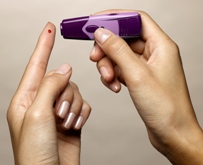New trial offers hope for diabetics
Release Date 27 May 2011

Research at the University of Reading could eliminate the need for people with Type 1 diabetes to check their glucose levels by pricking their fingers.
The Department of Food and Nutritional Sciences is working with Lein Applied Diagnostics on a clinical trial which could lead to the development of a meter that measures glucose in the eye using a low power beam.
Currently, people with Type 1 diabetes use painful and cumbersome ‘finger sticks' to gain a sample of blood to measure their glucose levels. Type 1 diabetes develops when the insulin-producing cells in the body have been destroyed and the body is unable to produce any insulin.
Insulin is the key that unlocks the door to the body's cells. Once the door is unlocked glucose can enter the cells where it is used as fuel. In Type 1 diabetes the body is unable to produce any insulin so there is no key to unlock the door and the glucose builds up in the blood.
The aim of the trial is to develop a model of how the characteristics of the eye change when glucose changes in the blood. The longer term is goal is to produce a meter with the look and feel of a mobile phone, and the user will simply look into it and press a button to get their reading.
Professor Julie Lovegrove, who is leading the trial, said: "We know that people with Type 1 diabetes find the present way of checking glucose levels time-consuming and painful. We hope this research will lead to technology that will improve their quality of life."
The study is still looking for volunteers. Participants need to be males with Type 1 diabetes between 18 and 35. Please contact Jan Luff at j.e.luff@reading.ac.uk or call 0118 378 7771.
Lein Applied Diagnostics has recently moved into the University's new Reading Enterprise Centre, which will be officially opened by the Minister for Enterprise in June.
Dr Daniel Daly, of the company, said: "Lein is a rapidly growing technology company that needs flexible accommodation to suit its specific needs. A major benefit is convenient access to the University's academics and support infrastructure."
ENDS
For more information, please contact Rona Cheeseman, press officer, o 0118 378 7388 or email r.cheeseman@reading.ac.uk
Notes to editors
The Department of Food and Nutritional Sciences is the largest university department of its kind in the UK, combining state-of-the-art teaching facilities, a linical nutrition unit, labs and the largest pilot processing plant in the UK. The department is internationally recognised for the quality of its research and enjoys a high public profile both domestically and internationally.
